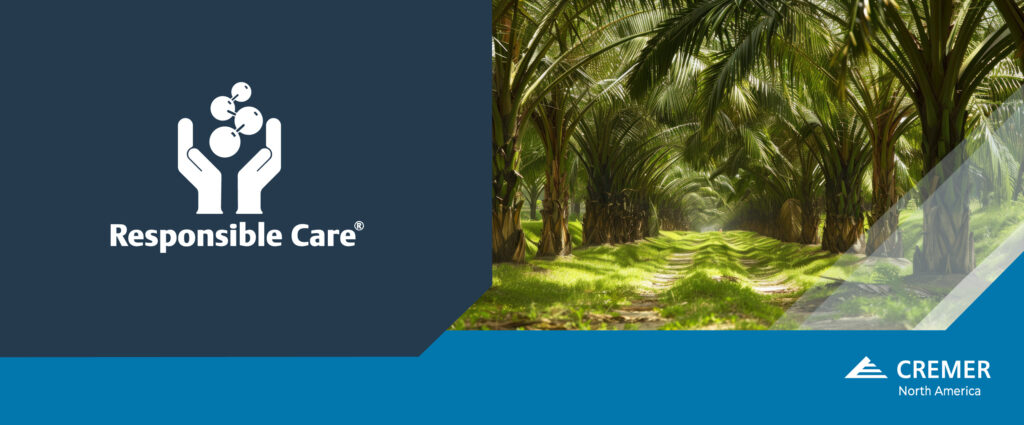Responsible Care: For CREMER And Our Communities
Sustainability is at the heart of what CREMER does, and one of the ways that we live that value is through our practice of the Responsible Care model. We spoke with Griffin Cahill, Sustainability and Responsible Care Coordinator, to learn more about how Responsible Care looks at CREMER and what it means for sustainability.

What is the Responsible Care model for chemicals?
First implemented by members of the American Chemistry Council (ACC), the Responsible Care model is a set of standards and processes that prevent, analyze the cause of, and implement changes caused by workplace incidents in the chemical fields.
While CREMER North America is not a current member of the ACC, we do follow the standards and processes outlined in the Responsible Care model.
What does Responsible Care require?
To follow the Responsible Care model, companies require a system of documentation, audits, and incident management that relies on workplace transparency, communication, and a growth mindset. These fundamental requirements play out in a couple of ways:
- Coordination with local emergency services including the local chapters of the EPA and Coast Guard.
- Scheduled and impromptu audits of workplace conditions.
- Review of in-house incidents with a mindset of future prevention and growth.
- Participation in a local emergency planning committee and Greater Cincinnati Harbor & Maritime Co-Operative Committee (GCHMCC) to plan contingencies for potential emergencies.
Cahill says, “These processes make for a workplace where employees can speak up about unsafe work environments, the community feels connected to the company, and both the company and community feel prepared for any potential incidents.”
How does CREMER apply Responsible Care methods?
Responsible Care models align closely with the CREMER values, particularly Sustainability and Citizenship, and Honesty. As citizens who strive to work honestly and sustainably within our communities, we live the Responsible Care methods every day.
Continuous improvement of internal processes
A mindset of continuous improvement looks like
- Ensuring everyone follows documented processes and procedures.
- Proper incident management.
- Investigating root causes of accidents.
- Adjusting documentation as needed.
CREMER implements a software incident management system that organizes incidents across the company and centralizes the standard operating procedure (SOP) documentation. Cahill says, “The software helps employees and leadership find the root cause of an incident, create an action, put it in place, and revisit the solution after a period of time.”
While all of this may feel rigid to an outside observer, procedures can be changed. But the Responsible Care model checks that we have communicated the change and follow the new documented procedure.
Transparency and communication with external partners
CREMER works closely with local officials and emergency services to mitigate issues quickly and plan for potential incidents. We pride ourselves on our transparency and communication, as we know it builds trust with the community, which would make future interventions easier. We also publish our standards to the community and with our partner companies. We thoroughly vet our partners, making sure they adhere to and uphold our standards.
The challenges of Responsible Care
If Responsible Care didn’t present any challenges, everyone would do it. Two main challenges that we see internally, change management and partner communication, are found across industries. But at CREMER we pay particular attention to these challenges, as we know their importance for the overall sustainability of our business and our products.
- Change management: Documentation must go further than writing down the new process. Communicating that process to all stakeholders, being transparent about the reasons for the change, and answering uncomfortable questions can be challenging for any company. That’s why we work so hard to make sure it’s done right.
- Partner communication: Our partnerships define our products, and CREMER values clear and consistent communication with third parties. We need our safety standards and priorities to align, and we must be able to call out issues as they come up to mitigate them quickly for the good of the customer.
Sustainability through Responsible Care
Sustainability is at the heart of our business — not just the oleochemicals we supply. To build a sustainable business, we identify, document, analyze, mitigate, iterate and follow-up for every incident. This helps us to reduce our overall incident count, and leaves us time to work on larger issues that affect CREMER’s bottom line and our role in the community.
For example, the team has been working on identifying and repairing leaks within the steam condensate systems. These leaks are a quick win for sustainability. The leaks make our steam systems work harder as they lose heat and water that would otherwise be recycled in the system. In the current project, the team is working to find leaks, repair them, and prevent future breaks in the lines.
We see it as a testament to the transparency and continuous improvement mindsets that CREMER team members work under that we have the space to focus on projects that look to the future, instead of only focusing on today’s incidents.